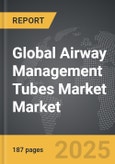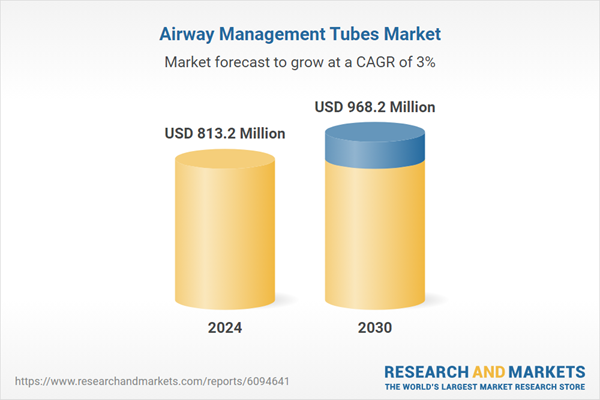Global Airway Management Tubes Market - Key Trends & Drivers Summarized
Why Are Airway Management Tubes Central to Respiratory Control, Anesthesia Delivery, and Life-Saving Interventions?
Airway management tubes - including endotracheal tubes (ETTs), tracheostomy tubes, and nasopharyngeal airways - are fundamental to securing the upper airway, ensuring gas exchange, and delivering mechanical ventilation during surgery, critical illness, or emergency care. These tubes maintain a patent airway and facilitate the controlled administration of oxygen, anesthetic gases, and positive pressure ventilation.Their strategic significance lies in their use across a wide range of acute care situations, from operating rooms and ICUs to emergency departments and ambulances. By enabling reliable airway patency and minimizing aspiration risk, these tubes serve as frontline tools in managing respiratory failure, anesthesia induction, trauma stabilization, and post-operative recovery, making them indispensable across multidisciplinary clinical workflows.
How Are Product Design Advancements, Single-Use Protocols, and Specialized Applications Shaping Tube Development?
Advances in airway tube design are improving safety, efficiency, and patient comfort. Features such as cuff pressure indicators, subglottic secretion drainage, radiopaque markings, and reinforced walls are now standard in high-performance ETTs. Specialized tubes - like armored, laser-resistant, or double-lumen variants - are tailored for complex surgeries, neuromuscular conditions, and lung isolation procedures.The global shift toward infection control has accelerated the adoption of sterile, disposable tubes, reducing cross-contamination risks and aligning with hospital-acquired infection (HAI) prevention mandates. Pediatric and neonatal airway tubes with miniaturized dimensions, soft tips, and age-specific lengths are gaining ground, while pre-formed nasal tubes and adjustable flange tracheostomy tubes support procedural flexibility in long-term ventilation scenarios.
Which Patient Profiles, Clinical Use Cases, and Regional Care Systems Are Driving Demand for Airway Management Tubes?
Demand spans perioperative care, mechanical ventilation support in ICUs, trauma response, and emergency airway control in EMS. Patients with respiratory distress, surgical needs, neurological compromise, or upper airway obstruction rely on these tubes for airway stability. Tracheostomy tubes are widely used in prolonged ventilation, head and neck surgeries, and in managing chronic pulmonary conditions.North America dominates the market, driven by procedural intensity, critical care capacity, and standardized protocols. Europe emphasizes quality assurance and device traceability. Asia-Pacific is experiencing rapid uptake due to expanding healthcare infrastructure, critical care access, and surgical caseloads. In emerging markets, rising awareness, growing training programs, and public-private investments are expanding the footprint of airway tube availability and usage.
What Strategic Role Will Airway Management Tubes Play in Enhancing Critical Respiratory Care, Infection-Safe Practices, and Emergency Readiness?
Airway management tubes are poised to remain foundational in high-acuity care delivery as healthcare systems scale up their critical care, trauma management, and respiratory disease response capabilities. Their design evolution, alignment with infection-safe protocols, and adaptability across patient types make them core assets in achieving procedural success and care continuity.As innovation progresses toward smart tubes with integrated sensors and real-time monitoring capabilities, could airway management tubes evolve into intelligent conduits that redefine how clinicians manage ventilation, sedation, and airway protection across increasingly complex and data-driven care environments?
Report Scope
The report analyzes the Airway Management Tubes market, presented in terms of market value (US$). The analysis covers the key segments and geographic regions outlined below:- Segments: Device (Supraglottic Devices, Infraglottic Devices, Resuscitators, Other Devices).
- Geographic Regions/Countries: World; United States; Canada; Japan; China; Europe (France; Germany; Italy; United Kingdom; Spain; Russia; and Rest of Europe); Asia-Pacific (Australia; India; South Korea; and Rest of Asia-Pacific); Latin America (Argentina; Brazil; Mexico; and Rest of Latin America); Middle East (Iran; Israel; Saudi Arabia; United Arab Emirates; and Rest of Middle East); and Africa.
Key Insights:
- Market Growth: Understand the significant growth trajectory of the Supraglottic Devices segment, which is expected to reach US$454.2 Million by 2030 with a CAGR of a 2.1%. The Infraglottic Devices segment is also set to grow at 4.2% CAGR over the analysis period.
- Regional Analysis: Gain insights into the U.S. market, valued at $221.5 Million in 2024, and China, forecasted to grow at an impressive 5.4% CAGR to reach $187.5 Million by 2030. Discover growth trends in other key regions, including Japan, Canada, Germany, and the Asia-Pacific.
Why You Should Buy This Report:
- Detailed Market Analysis: Access a thorough analysis of the Global Airway Management Tubes Market, covering all major geographic regions and market segments.
- Competitive Insights: Get an overview of the competitive landscape, including the market presence of major players across different geographies.
- Future Trends and Drivers: Understand the key trends and drivers shaping the future of the Global Airway Management Tubes Market.
- Actionable Insights: Benefit from actionable insights that can help you identify new revenue opportunities and make strategic business decisions.
Key Questions Answered:
- How is the Global Airway Management Tubes Market expected to evolve by 2030?
- What are the main drivers and restraints affecting the market?
- Which market segments will grow the most over the forecast period?
- How will market shares for different regions and segments change by 2030?
- Who are the leading players in the market, and what are their prospects?
Report Features:
- Comprehensive Market Data: Independent analysis of annual sales and market forecasts in US$ Million from 2024 to 2030.
- In-Depth Regional Analysis: Detailed insights into key markets, including the U.S., China, Japan, Canada, Europe, Asia-Pacific, Latin America, Middle East, and Africa.
- Company Profiles: Coverage of players such as ADB SAFEGATE, Aeva Technologies, Ametek, Inc., Avlite Systems, Blighter Surveillance Systems and more.
- Complimentary Updates: Receive free report updates for one year to keep you informed of the latest market developments.
Some of the 43 companies featured in this Airway Management Tubes market report include:
- Ambu A/S
- Armstrong Medical Ltd
- Becton, Dickinson & Co.
- Boston Scientific Corp.
- ConvaTec Group plc
- Cook Medical
- Drägerwerk AG & Co. KGaA
- Fisher & Paykel Healthcare
- Flexicare Medical Ltd
- Fuji Systems Corporation
- ICU Medical, Inc.
- Intersurgical Ltd
- Karl Storz SE & Co. KG
- Medline Industries, LP
- Medtronic plc
- Mercury Medical
- Olympus Corporation
- Smiths Medical (ICU Medical)
- Teleflex Incorporated
- Vyaire Medical, Inc.
This edition integrates the latest global trade and economic shifts into comprehensive market analysis. Key updates include:
- Tariff and Trade Impact: Insights into global tariff negotiations across 180+ countries, with analysis of supply chain turbulence, sourcing disruptions, and geographic realignment. Special focus on 2025 as a pivotal year for trade tensions, including updated perspectives on the Trump-era tariffs.
- Adjusted Forecasts and Analytics: Revised global and regional market forecasts through 2030, incorporating tariff effects, economic uncertainty, and structural changes in globalization. Includes historical analysis from 2015 to 2023.
- Strategic Market Dynamics: Evaluation of revised market prospects, regional outlooks, and key economic indicators such as population and urbanization trends.
- Innovation & Technology Trends: Latest developments in product and process innovation, emerging technologies, and key industry drivers shaping the competitive landscape.
- Competitive Intelligence: Updated global market share estimates for 2025, competitive positioning of major players (Strong/Active/Niche/Trivial), and refined focus on leading global brands and core players.
- Expert Insight & Commentary: Strategic analysis from economists, trade experts, and domain specialists to contextualize market shifts and identify emerging opportunities.
Table of Contents
Companies Mentioned (Partial List)
A selection of companies mentioned in this report includes, but is not limited to:
- Ambu A/S
- Armstrong Medical Ltd
- Becton, Dickinson & Co.
- Boston Scientific Corp.
- ConvaTec Group plc
- Cook Medical
- Drägerwerk AG & Co. KGaA
- Fisher & Paykel Healthcare
- Flexicare Medical Ltd
- Fuji Systems Corporation
- ICU Medical, Inc.
- Intersurgical Ltd
- Karl Storz SE & Co. KG
- Medline Industries, LP
- Medtronic plc
- Mercury Medical
- Olympus Corporation
- Smiths Medical (ICU Medical)
- Teleflex Incorporated
- Vyaire Medical, Inc.
Table Information
| Report Attribute | Details |
|---|---|
| No. of Pages | 187 |
| Published | February 2026 |
| Forecast Period | 2024 - 2030 |
| Estimated Market Value ( USD | $ 813.2 Million |
| Forecasted Market Value ( USD | $ 968.2 Million |
| Compound Annual Growth Rate | 3.0% |
| Regions Covered | Global |









